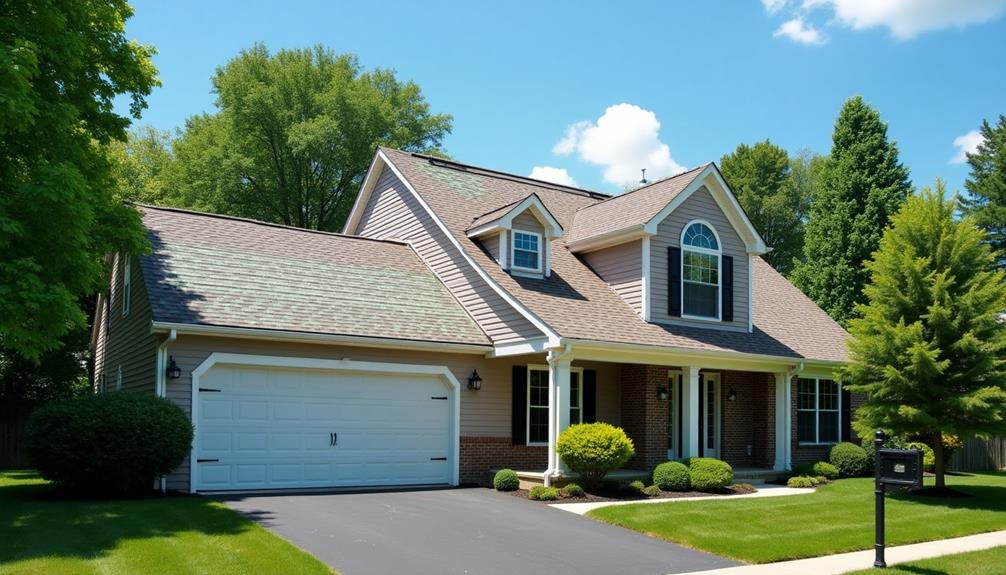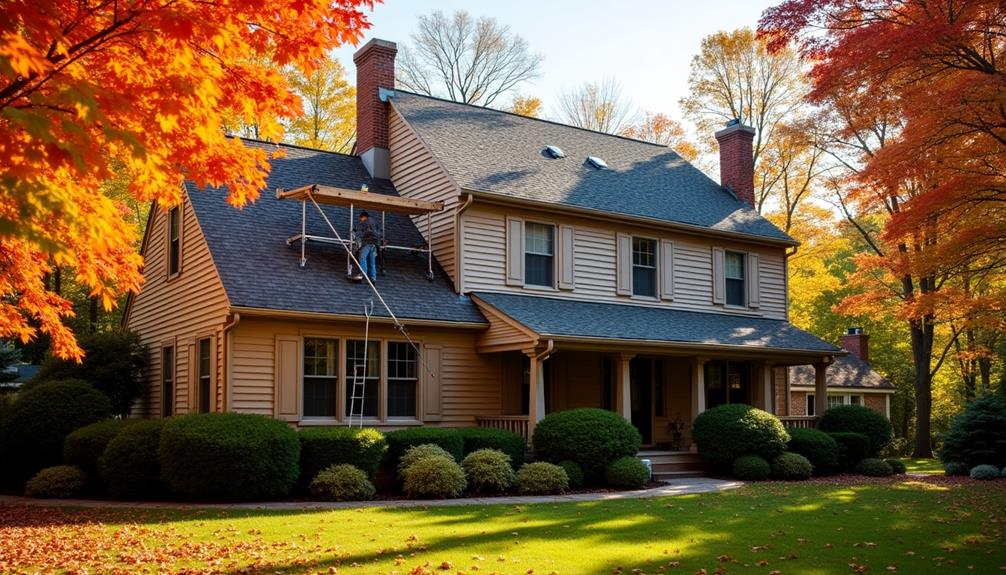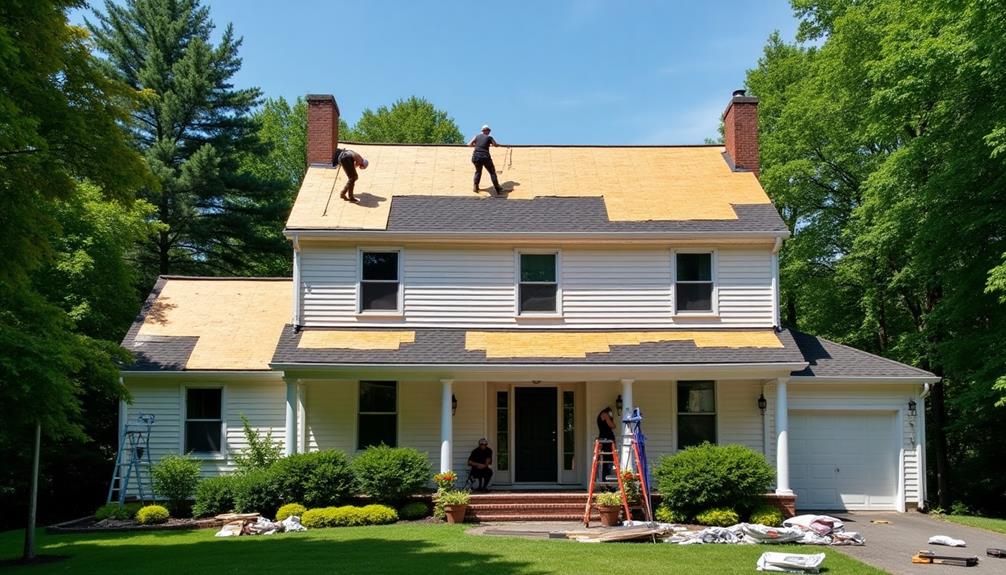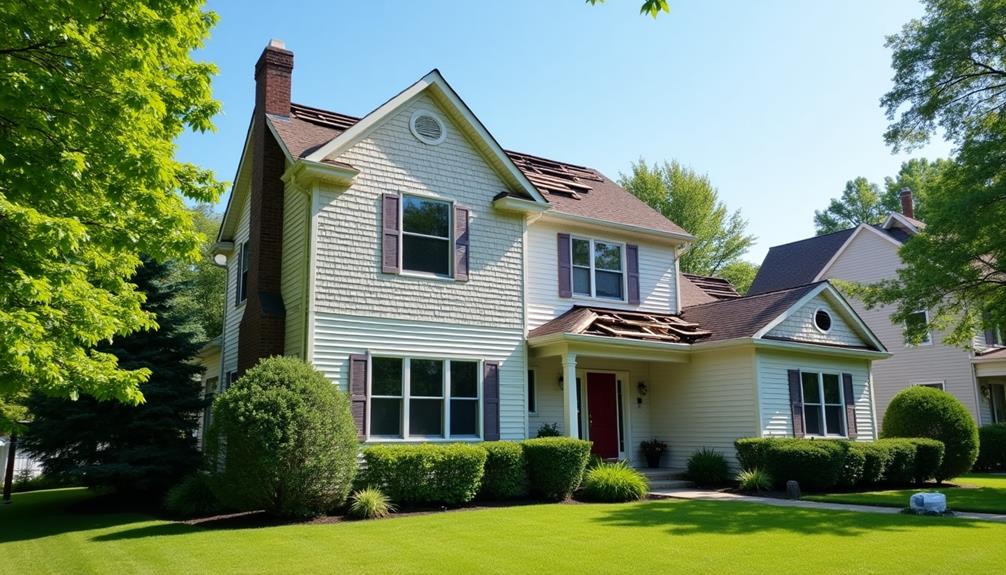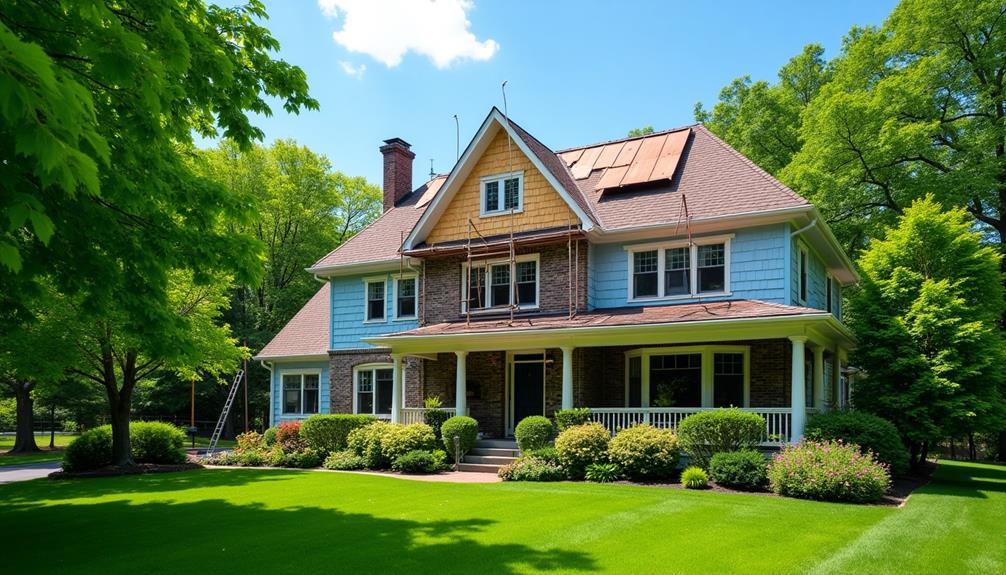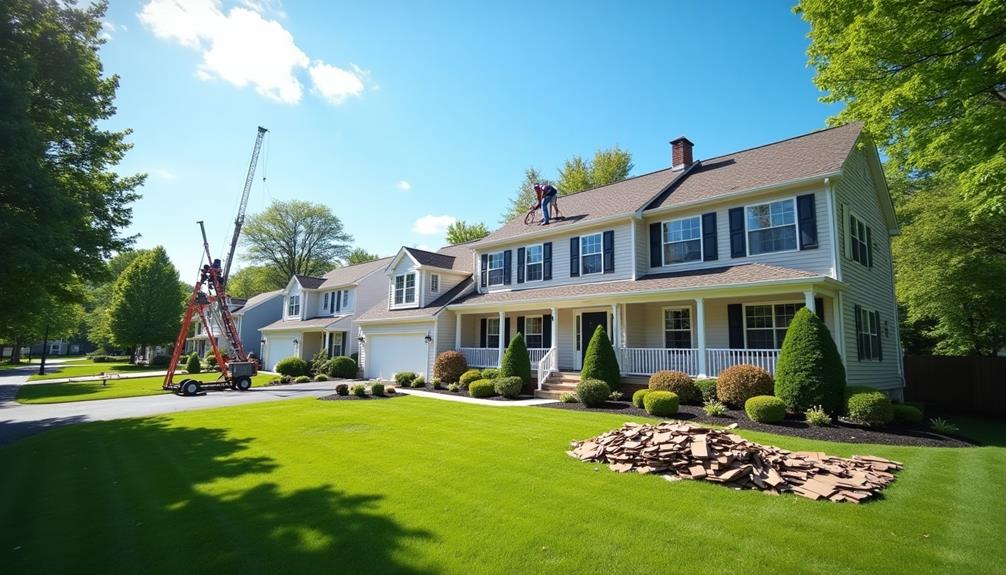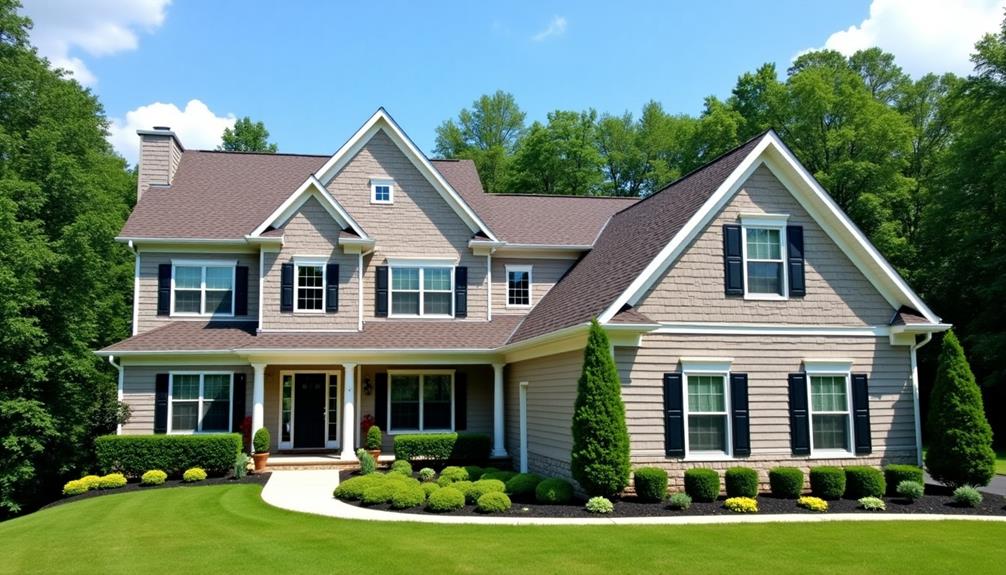If you're considering roof replacement in Lawrence Township, NJ, watch for signs like sagging, leaks, or missing shingles. These indicate necessary action to prevent structural damage. You're faced with various quality materials, each offering unique lifespans and costs. Asphalt shingles are affordable, while metal roofing provides durability. Timely replacement enhances your home's energy efficiency and resale value. Be aware of local building regulations—permits may be needed. Choosing a qualified contractor is crucial for a successful installation. By prioritizing these factors, you can ensure a smooth process and improved outcomes, so you'll want to explore more about options and local resources.
Signs You Need a Replacement
When it comes to maintaining your home, recognizing the signs that you need a roof replacement is crucial. One of the most alarming indicators is a sagging roof. If you notice any dips or uneven areas, it's essential to address this issue immediately. A sagging roof often signals structural damage, which can lead to more significant problems if left uncorrected.
Another critical sign to watch for is mold growth. If you spot mold or mildew, especially in your attic or on the underside of your roof, this could indicate trapped moisture. Mold can weaken your roof's integrity and pose health risks to your family.
Leaks are also a clear sign that your roof may need replacing. If you're experiencing water stains on your ceiling or walls, it's time to investigate further.
Additionally, missing or damaged shingles can expose your home to the elements, accelerating deterioration.
Regular inspections can help you catch these signs early, allowing you to make informed decisions regarding maintenance or replacement. Ignoring these warning signs can lead to costly repairs down the line, so stay vigilant and proactive about your roofing needs.
Understanding Roof Materials
When replacing your roof, understanding the various materials available is crucial.
You'll want to consider popular options, their durability and longevity, as well as the associated costs.
Making an informed choice will ensure your new roof meets your needs and budget effectively.
Popular Roofing Options
Choosing the right roofing material is crucial for the longevity and performance of your home. When considering options, you'll find that shingle varieties and metal roofing are among the most popular choices.
Asphalt shingles are the most common, offering affordability and ease of installation. They come in various colors and styles, allowing you to customize your home's appearance. Architectural shingles, a higher-end option, provide enhanced durability and a more dimensional look.
If you're looking for something more durable, metal roofing could be the perfect fit. Available in materials like steel, aluminum, and copper, metal roofs stand up well against harsh weather conditions. They reflect heat, which can help lower your energy bills, and they typically last longer than shingles.
Both roofing options have their pros and cons, so it's important to assess your specific needs, budget, and aesthetic preferences.
Always consult with a professional to evaluate the best roofing material for your home in Lawrence Township, NJ. Ultimately, making an informed decision will contribute significantly to the overall performance and appeal of your roof.
Durability and Longevity
The durability and longevity of roof materials play a significant role in determining the overall performance of your home. Selecting the right roofing material can significantly influence your roof life and its ability to withstand various weather conditions. Understanding the characteristics of different materials helps you make informed decisions.
Here's a comparison of common roofing materials regarding their durability and weather resistance:
| Material | Average Roof Life | Weather Resistance |
|---|---|---|
| Asphalt Shingles | 15-30 years | Moderate |
| Metal Roofing | 40-70 years | Excellent |
| Clay Tiles | 50+ years | Excellent |
| Wood Shakes | 30-40 years | Good |
| Slate | 75+ years | Excellent |
Each material exhibits unique properties that affect its performance. For example, metal roofing offers superior weather resistance, making it ideal for areas prone to extreme conditions. In contrast, asphalt shingles provide a more affordable option but may require replacement sooner. By understanding these factors, you can choose materials that align with your needs for durability and longevity, ensuring your investment stands the test of time.
Cost Considerations
Navigating the cost considerations of roof materials is crucial for making a sound investment in your home. First, you'll need to evaluate the various types of roofing materials available, such as asphalt shingles, metal, or slate. Each option carries different upfront costs and long-term value.
For instance, while asphalt shingles are generally less expensive, metal roofs offer greater durability and energy efficiency, which may save you money in the long run.
Next, consider financing options if the initial cost is a concern. Many contractors offer payment plans or financing to help you manage the expense over time. Additionally, check if your homeowner's insurance provides coverage for roof replacement, as this could significantly reduce your out-of-pocket costs.
Don't forget to factor in potential maintenance expenses associated with different materials. Some may require more upkeep than others, which can influence the total cost over time.
Benefits of Timely Replacement
Timely roof replacement can save homeowners in Lawrence Township NJ a significant amount of money and stress. When you replace your roof before it deteriorates, you prevent costly repairs from leaks and structural damage.
A new roof enhances energy efficiency, as modern materials and installation techniques create better insulation. This means your heating and cooling systems won't have to work as hard, leading to lower utility bills.
Furthermore, a timely roof replacement can lead to increased property value. Homebuyers are often willing to pay a premium for a home with a new roof, as it signifies reduced maintenance concerns. This investment not only protects your current living situation but also pays dividends if you decide to sell your home in the future.
Additionally, a new roof can improve your home's curb appeal. A well-maintained exterior attracts potential buyers and can make your home stand out in the competitive Lawrence Township market.
Local Building Regulations
When planning a roof replacement in Lawrence Township NJ, it's crucial to understand local building regulations. These regulations ensure that your project complies with safety standards and community guidelines.
First, check if you need a building permit. Typically, any significant changes to your roof, such as material alterations or structural modifications, require one. The application process usually involves submitting plans and specifications to the local building department for approval.
Next, familiarize yourself with zoning laws. These laws dictate what types of materials and designs are permissible in your area, often influenced by the character of the neighborhood. For example, some zones may restrict the height or pitch of roofs to maintain aesthetic uniformity.
It's also wise to verify if there are any historical preservation guidelines if your property is in an older district. Failing to adhere to these regulations can result in fines or the need to redo work that doesn't meet code.
Choosing the Right Contractor
Choosing the right contractor for your roof replacement in Lawrence Township NJ can significantly impact the quality and longevity of your new roof. Start by evaluating contractor qualifications, including licenses, insurance, and experience. A well-qualified contractor not only adheres to local regulations but also ensures the job's done correctly.
Next, request contractor references to gain insight into their work ethics and quality. Speaking with previous clients can give you a clearer picture of what to expect.
| Criteria | Importance | How to Verify |
|---|---|---|
| Contractor Qualifications | Ensures compliance and quality | Check licenses and insurance |
| Contractor References | Assesses past performance | Contact previous clients |
| Experience | Indicates reliability | Review years in business |
| Warranty Terms | Protects your investment | Ask for written warranties |
| Communication Skills | Ensures project clarity | Evaluate responsiveness |
Cost Factors to Consider
When planning your roof replacement, it's crucial to consider how your choice of materials affects overall costs.
Different materials come with varying price points and durability, impacting both initial expenses and long-term maintenance.
Additionally, labor costs can fluctuate based on the complexity of the installation and the contractor's expertise, so understanding these factors will help you budget effectively.
Material Choices Impact Costs
Material selection plays a crucial role in determining the overall cost of roof replacement in Lawrence Township, NJ. When you're choosing materials, consider both their durability and aesthetic appeal.
For instance, asphalt shingles offer a cost-effective solution with decent durability, making them a popular choice. However, they may not last as long as premium materials like metal or slate, which can significantly increase your initial investment.
Metal roofing, while more expensive upfront, boasts exceptional durability and longevity, often lasting 40 years or more. This can translate to lower long-term costs due to reduced maintenance and replacement frequency.
On the other hand, slate provides a timeless aesthetic that enhances property value but comes at a high price point.
Additionally, eco-friendly options, like recycled shingles, might be more expensive initially but can save you money on energy bills in the long run.
It's essential to balance your budget with the desired look and lifespan of the roof. By carefully evaluating your material choices, you can make informed decisions that align with your financial goals while ensuring your roof meets your durability and aesthetic needs.
Labor Expenses Overview
While selecting the right materials is key to managing your roof replacement costs, labor expenses also play a significant role in the overall budget. Understanding labor rates in your area is crucial, as they can vary significantly based on experience and demand. On average, you might find that skilled laborers charge more, but their expertise can lead to a more efficient and higher-quality installation.
Project timelines are another critical factor influencing labor costs. A complex roof design or adverse weather conditions can extend the project duration, leading to increased labor expenses. If a project takes longer than anticipated, you'll likely incur additional costs for the extra hours worked.
When planning your roof replacement, it's essential to obtain detailed quotes from multiple contractors. This helps you compare labor rates and estimate total labor costs accurately.
Always check references and ensure that the contractors you consider have a solid reputation for timely and efficient work. By factoring in labor expenses alongside materials, you can develop a comprehensive budget that minimizes surprises and keeps your project on track.
Maintenance Tips Post-Replacement
After completing your roof replacement, it's crucial to implement a regular maintenance routine to ensure its longevity and performance.
Start with preventive maintenance by clearing debris from gutters and downspouts. This prevents water buildup, which can lead to leaks and damage.
Schedule seasonal inspections, ideally in spring and fall. During these inspections, check for loose shingles, rusted flashing, and signs of wear around vents and chimneys.
Addressing small issues promptly can prevent costly repairs later.
It's also important to monitor your roof's performance during heavy weather. After storms, inspect for any visible damage or missing shingles. If you notice any issues, contact a professional for repairs as soon as possible.
Keep an eye on your attic's ventilation and insulation as well. Proper ventilation helps regulate temperature and moisture levels, which can decrease the risk of mold and extend your roof's lifespan.

